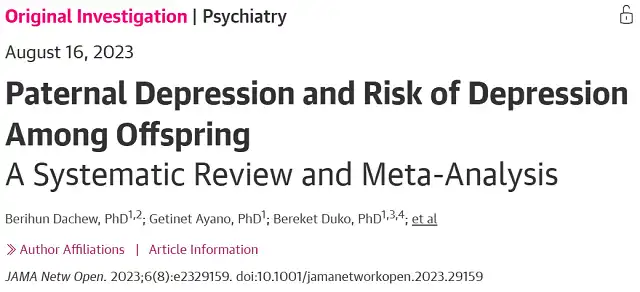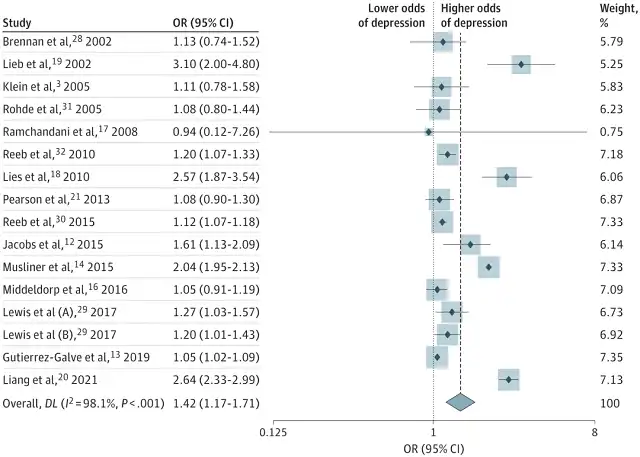42% increased risk of offspring depression associated with paternal depression!
- Normal Liver Cells Found to Promote Cancer Metastasis to the Liver
- Nearly 80% Complete Remission: Breakthrough in ADC Anti-Tumor Treatment
- Vaccination Against Common Diseases May Prevent Dementia!
- New Alzheimer’s Disease (AD) Diagnosis and Staging Criteria
- Breakthrough in Alzheimer’s Disease: New Nasal Spray Halts Cognitive Decline by Targeting Toxic Protein
- Can the Tap Water at the Paris Olympics be Drunk Directly?
42% increased risk of offspring depression associated with paternal depression!
- Should China be held legally responsible for the US’s $18 trillion COVID losses?
- CT Radiation Exposure Linked to Blood Cancer in Children and Adolescents
- FDA has mandated a top-level black box warning for all marketed CAR-T therapies
- Can people with high blood pressure eat peanuts?
- What is the difference between dopamine and dobutamine?
- How long can the patient live after heart stent surgery?
Data from over 14 million individuals confirms a 42% increased risk of offspring depression associated with paternal depression!
The neurodevelopmental theory of depression suggests that certain factors in early life are associated with an increased risk of depression in adulthood [1,2]. While the impact of maternal depression in the family environment has been extensively studied and recognized as a significant risk factor for offspring depression [3,4], the influence of paternal depression has not been thoroughly investigated, and existing research findings have been inconsistent.
Given the increasing demand for fathers’ active involvement in childcare and the ongoing rise in the prevalence of depression, understanding the impact of paternal depression on offspring depression is of utmost importance.
To address this, a research team from Curtin University in Australia conducted a systematic review and meta-analysis based on 16 observational studies involving data from over 7.15 million parent-offspring pairs. They found that paternal depression is associated with a 42% increased risk of offspring depression. This study was published in JAMA Network Open [5], marking the first systematic review and meta-analysis to evaluate the association between paternal depression and offspring depression.

The research involved a search of five databases – Embase, PubMed, Scopus, PsycInfo, and Web of Science – for observational studies reporting the association between paternal depression and offspring depression, up to December 15, 2022.

The final analysis included 16 eligible studies, with 11 of them reporting a significant positive association between paternal depression and offspring depression. The results of the meta-analysis showed that offspring exposed to paternal depression had a 42% higher risk of depression compared to those not exposed.
Stratified analysis revealed that studies considering paternal depression as a disorder, rather than just symptoms, showed a significantly higher increase in offspring depression risk (65% vs. 12%). Similarly, offspring consistently exposed to paternal depression from the prenatal and early childhood stages had a substantially higher risk (58% vs. 22% vs. 5%).
After excluding two studies that reported unadjusted risk models, the association between paternal depression and offspring depression risk still held, with a 47% increase in risk.
Compared to studies considering factors such as maternal prenatal and perinatal alcohol and/or other drug use, those not considering these factors showed a greater increase in offspring depression risk (46% vs. 26%), similar to the effect of maternal depression.
The researchers believe that these findings underscore the importance of addressing paternal mental health issues to reduce the adverse impact on offspring mental health, rather than solely focusing on maternal mental health during the prenatal and perinatal periods.
The mechanisms underlying the association between paternal and offspring depression are not yet clear. Genetic and epigenetic mechanisms are commonly proposed explanations.
A 2010 study found that genetic factors account for 40% of the risk of depression, consistent with other etiological studies exploring intergenerational transmission of depression.
Epigenetic mechanisms typically involve DNA methylation and histone modifications and may also mediate the intergenerational transmission of paternal depression.
Existing evidence suggests that DNA methylation and histone modifications can reliably distinguish stable and heritable features of depression.
In the future, further research is needed to better complement the results of existing observational studies by exploring these potential mechanisms.
42% increased risk of offspring depression associated with paternal depression!
References:
[1] Gałecki P, Talarowska M. Neurodevelopmental theory of depression[J]. Progress in Neuro-Psychopharmacology and Biological Psychiatry, 2018, 80: 267-272.
[2] Ayano G, Betts K, Lin A, et al. Maternal and paternal mental health problems and the risk of offspring depression in late adolescence: findings from the Raine study[J]. Journal of Mental Health, 2021, 30(3): 349-357.
[3] Chithiramohan T, Eslick G D. Association Between Maternal Postnatal Depression and Offspring Anxiety and Depression in Adolescence and Young Adulthood: A Meta-Analysis[J]. Journal of Developmental & Behavioral Pediatrics, 2023, 44(3): e231-e238.
[4] Tirumalaraju V, Suchting R, Evans J, et al. Risk of depression in the adolescent and adult offspring of mothers with perinatal depression: a systematic review and meta-analysis[J]. JAMA network open, 2020, 3(6): e208783-e208783.
[5] Dachew B, Ayano G, Duko B, et al. Paternal Depression and Risk of Depression Among Offspring: A Systematic Review and Meta-Analysis[J]. JAMA Network Open, 2023, 6(8): e2329159.
(source:internet, reference only)
Disclaimer of medicaltrend.org
Important Note: The information provided is for informational purposes only and should not be considered as medical advice.



